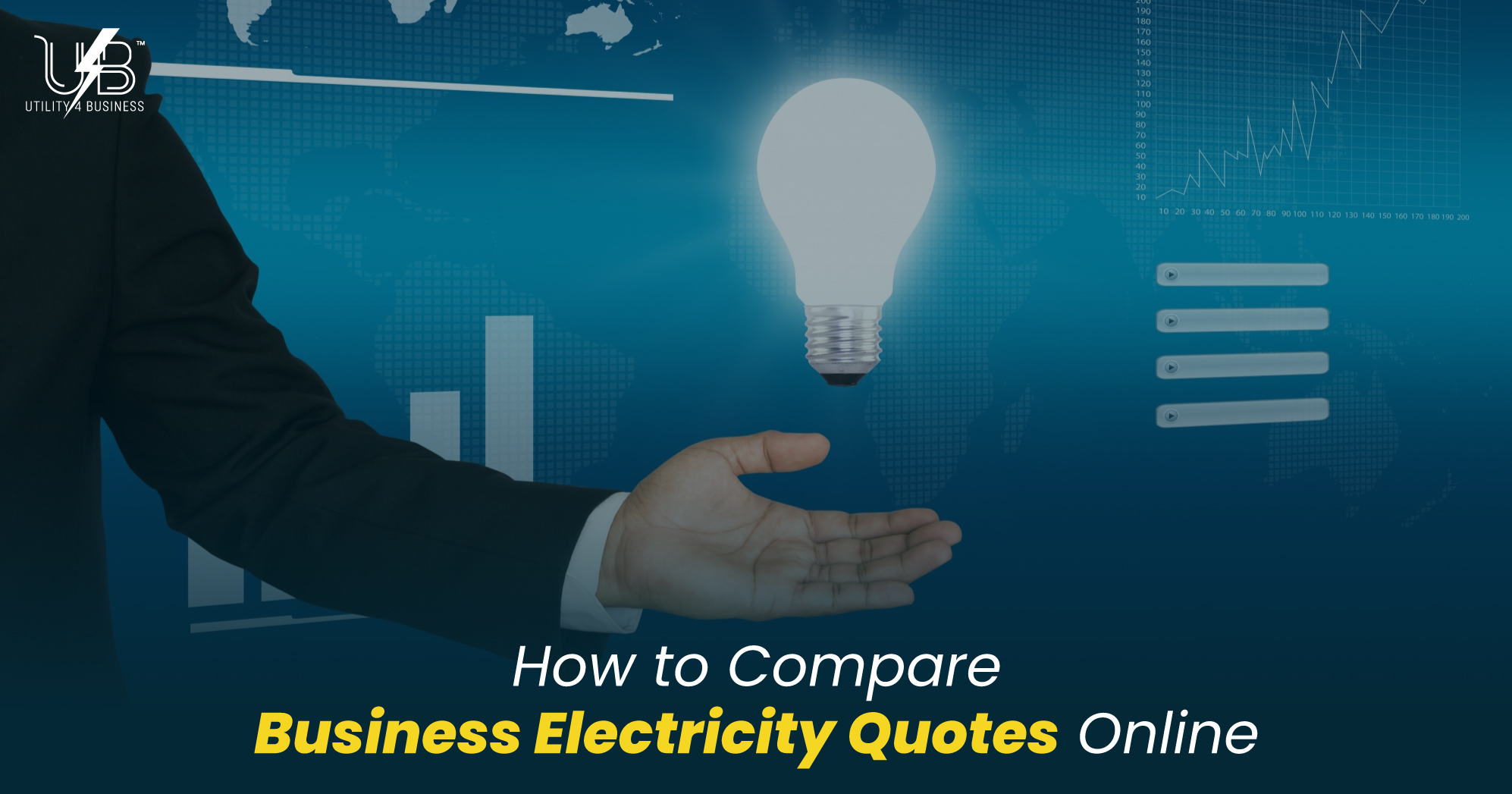Top Criteria For Evaluating A Business Electricity Supplier
Find The Right Supplier

Choosing a business electricity supplier is not a simple rate check. It is a decision that affects cost control, time spent on billing issues, and the way your sites will run over the next one to three years. Prices move, non-energy charges shift, and rules evolve. The right supplier gives clear terms, accurate bills, useful data, and support that responds when you need it. At Utility4Business, we help companies run a business electricity comparison that focuses on what actually drives their bills. This guide explains the criteria that matter and how to apply them in practice.
Start With Contract Type And Tariff Structure
Your contract choice sets the base for every future invoice. Most firms pick between fixed-rate and variable or flexible structures. A fixed-rate deal can help with budgeting because the unit price stays the same during the term. You will not benefit if the market falls, but you will remove the risk of sudden spikes. A variable or flexible option can track market moves and sometimes cut costs when prices ease, yet it brings more risk in volatile periods.
Look beyond a headline unit rate. Check the standing charge, the contract length, the start date, and any minimum use clause. Confirm if the unit rate is truly fixed or if it can change for certain reasons written into the contract. Ask about the end-of-term rules. Some contracts roll over to out-of-contract rates if you do nothing. A clear contract should set a fair notice window and simple steps to switch or renew. Utility4Business always reviews both unit rates and standing charges as part of a full compare business electricity exercise, so you see the real cost, not just a headline price.
Balance Unit Rates With Non-Energy And Third-Party Charges
Your bill includes energy and several non-energy cost lines. These include network charges and government levies. In recent years, the structure of some network charges shifted toward fixed elements. That change increased the share of cost recovered through standing charges rather than only through unit rates. The practical lesson is simple. A cheap unit rate can still lead to a higher total bill if the standing charge is higher. When you compare quotes, split the price into energy, standing charge, and other items. Ask for a like-for-like breakdown across all suppliers.
You also need to consider the Climate Change Levy. Most businesses pay this levy on electricity and other fuels. The rate is set by the government and can change on 1 April each year. If you hold a Climate Change Agreement or qualify for reliefs, your effective levy can be lower. Make sure each quote explains how the levy is applied so you can compare offers on the same basis. At Utility4Business, our business electricity price comparison tables show energy, standing charge, and levy assumptions line by line to avoid confusion.
Check Metering Type, Data Quality, And Settlement
Accurate metering reduces bill disputes and helps you buy the right product. Many small and mid-sized sites use advanced or smart meters that send reads automatically. Larger or more complex sites often use half-hourly metering. Half-hourly data records your usage in 30-minute blocks. It reflects how your business actually uses power across the day and week. With half-hourly data, suppliers can price against your true load profile rather than averages.
If you have half-hourly data, request quotes that use your last 12 months of intervals. If you do not have that data yet, share as many actual reads and invoices as possible. Clean data allows a fairer price and helps you understand peak times, baseload, and waste. Utility4Business uses real interval data to compare electricity for businesses on an equal footing, so seasonality and operating hours are captured, not guessed.
Demand Transparency On Broker Fees And Dispute Routes
Many companies purchase energy through a consultant or broker. That can save time, but only if costs are transparent and service is reliable. Ask your intermediary to disclose fees or margins in writing. Keep this with your contract. Also, confirm the route to raise and resolve a dispute. If your business meets the size tests for microbusiness or small business support, you may access an independent ombudsman scheme for unresolved complaints. When Utility4Business manages a tender, we provide clear engagement terms and a written statement of our fees so your business electricity comparison includes the true end-to-end cost.
Assess Billing Accuracy, Invoice Format, And Online Tools
Billing quality shapes your day-to-day experience. Ask each supplier for a sample invoice and a demo of their portal. A good bill should show the unit rate, standing charge, metering details, VAT, and levy lines without confusion. The portal should export CSVs for your accounts system, display reads and consumption history, and allow you to download copies of invoices when you need them. For half-hourly sites, you should be able to view and export 30-minute data.
If you run many sites, ask about consolidated billing and site-level reporting. Check if the supplier supports purchase order references or custom invoice fields to match your finance process. Utility4Business scores billing quality during every business electricity suppliers review and includes that score alongside price, so you see the trade-offs in one place.
Read The Small Print: Rollover Rules, Termination, And Credit
Contract terms can matter as much as rates. Confirm the end-of-term process. If you miss the notice window, do you move to an expensive rate by default? Ask about termination rights and fees. If you plan to move premises, grow the portfolio, or add capacity, confirm how the contract handles siteworks and material changes. Some suppliers ask for a deposit when a firm is new or has a thin credit file. If a deposit is required, confirm how they hold it and when they return it.
Put renewal reminders in your calendar well ahead of the end date. Letting a contract lapse can lead to high out-of-contract rates. Utility4Business sets reminders for clients so we can renew in good time and avoid that risk.
Test Service Quality And Escalation Paths
You need a supplier that answers the phone and resolves issues quickly. Ask for their average response times to calls and emails. For larger portfolios, request a named account manager and a team inbox. Confirm the escalation ladder for invoice disputes, meter faults, and siteworks delays. Ask how they handle missed reads or estimated bills. A supplier that provides clear service commitments will save your team hours during the year.
At Utility4Business, we add a service score to every business electricity comparison, based on recent interactions and client feedback. It sits next to the price, so you balance cost with service before you sign.
Multi-Site Control And Siteworks
Your business can change during the contract. You might add sites, move locations, change operating hours, or install new equipment. Check that your supplier can handle adds and removes under a single agreement. Ask how long simple tasks take, such as a smart meter upgrade, a capacity increase, or a meter exchange. If you plan to install EV chargers, refrigeration, or other high-load equipment, share that plan before you sign. Accurate plans help the supplier price the real risk and avoid imbalance costs that can feed into your rates later.
Secure Access To Your Data
Good decisions rely on good data. Make sure you can export your usage history whenever you need it. For half-hourly sites, that means 30-minute curves. For smart-metered sites, that means daily reads and alerts for unusual consumption. Some suppliers offer APIs so you can pull data into your own dashboards. Test access before you decide. Data access helps you spot baseload at weekends, identify peak windows, and time-shift flexible loads. These steps can lower your non-energy charges and cut waste.
Evaluate Green Options And Proof Of Claims
Many suppliers sell “green” electricity. Offers differ in how they back those claims. Some match your consumption with renewable certificates. Others use power from specific generators or long-term power purchase agreements. Ask how the supplier proves the claim and which year the certificates cover. If you report against ESG frameworks, confirm whether they provide certificate retirement statements and year-end summaries. Utility4Business checks these items during every business electricity comparison to make sure the green label stands on evidence, not marketing.
Choose A Fixing Strategy That Fits Your Budget
Price risk never disappears. Even with a fixed deal, you face renewal risk when the term ends. Start early. Decide what term length fits your plans and cash flow. Record your target price and your walk-away points. For larger users, a layered strategy across several buying windows can manage risk across time. Whatever approach you choose, write it down and follow it with discipline. Utility4Business can help you set that plan and run the market checks when the time is right.
Review Supplier Stability And Financial Strength
A very low price can be tempting, but a supplier with weak finances can create disruption if it fails. While safeguards protect supply if a supplier exits the market, you can still face admin work and risk of different pricing with a new provider. Review public accounts, parent backing, and the way the supplier hedges. If a quote seems far below the market, ask how they fund and manage that position. Staying power is part of value.
Track Policy Changes That Shape Your Bill
Several policy and market changes can alter the way your bill is built. Network charges can move over time, which can shift more cost into standing charges for some users. The Climate Change Levy can also change from year to year. Keep these items in view when you plan budgets and when you review offers. This awareness helps you avoid surprises and makes your business electricity price comparison fairer.
Run A Clear, Repeatable Procurement Process
A structured process delivers better outcomes than a quick rate check. Here is a simple approach we use at Utility4Business when we compare business electricity for clients:
Define the goal first. Confirm term length, start date, and sites. Gather twelve to twenty-four months of invoices and meter reads. For half-hourly sites, export interval data. Set scoring that reflects your priorities. Price should hold a strong weight, but you should also score contract terms, billing tools, service, and green support. Invite suppliers that fit your metering and site mix. Ask for firm, fully costed offers. Request a sample bill and a portal demo. Break each quote into energy, standing charge, and other line items. Check termination and rollover rules. Decide and sign in time to avoid out-of-contract rates. After go-live, validate the first bill and confirm the portal works for your team.
This routine keeps the decision objective and reduces the time you spend chasing missing details.
Ask Every Shortlisted Supplier The Same Questions
A short list of questions can reveal gaps before you commit:
- Will you show all broker fees or margins in writing on the contract schedule?
- Does your online portal allow CSV export, invoice downloads, and, if relevant, half-hourly data exports?
- What is your process and typical timeline for meter exchanges, capacity increases, and other siteworks?
- What happens at the end of the term if we do not give notice on time?
- Do you support consolidated billing across all our sites?
- How do you provide evidence for green claims, and do you offer year-end reporting packs?
Record the answers on one sheet so you can compare suppliers fairly. Utility4Business includes these checks as standard in our comparison of business electricity suppliers reviews.
Avoid Common Pitfalls
Several mistakes often appear in business energy buying. Do not chase the lowest unit rate without checking the standing charge and non-energy items. Do not accept vague broker fees. Ask for a written disclosure and keep it on file. Do not let contracts lapse. Set reminders and renew early. Do not buy without data. Even three months of clear reads is better than estimates. Finally, do not ignore policy changes that can lift fixed charges or levies. A little attention here prevents large surprises later.
Build A Simple Scoring Model
A scoring model brings order to a complex choice. Assign points to price, contract terms, billing tools, service, data access, and sustainability support. Weigh price highly, but keep room to reward clarity and service. When you document the scores, decisions become easier to explain and defend. Your finance and operations teams will also see why one option won. Utility4Business provides a one-page summary that shows scores and costs side by side, so your business electricity comparison is fast to approve.
How Utility4Business Helps
Utility4Business focuses on clarity and control. We unpack quotes into energy, standing charges, network estimates, levies, and disclosed broker fees. We test portals, check billing formats, and confirm service routes. We align your contract with your plans, whether you expect to expand, add EV charging, or install solar. You receive a plain-English summary with a clear recommendation. We never use competitor names in our materials, and we keep the focus on your sites and your goals. If you want a quick sense check, we can compare a single site. If you manage a portfolio, we can produce a full view that sets out the best path for all locations together.
Bringing It All Together
Evaluating a business electricity supplier takes more than comparing two unit rates. You need to read the contract, test the billing tools, understand non-energy costs, and confirm support routes. You should look at metering and data access, check green claims, and plan for renewal. When you do these steps well, you reduce risk, avoid admin waste, and keep costs under control. At Utility4Business, we run a structured business electricity comparison that brings all of this together. Share your latest invoices and your renewal date, and we will present options that fit your budget and the way your business works.
Conclusion
A strong business electricity decision starts with structure. Choose a contract that matches your budget, and balance unit rates with standing charges and levies. Use accurate data to price your real usage. Demand clear disclosure of all fees and a simple route to resolve disputes. Test invoices and portals before you sign. Plan for change across your sites. Track policy updates that affect fixed costs. Then score your options and decide with confidence. If you prefer a guided path, Utility4Business will help you compare electricity for businesses in a way that is fair, clear, and built around your needs. This approach saves time today and prevents problems tomorrow.
Find This Article Helpful? Share It Now!
At Utility4Business, we offer top-notch customer support and business utility solutions for businesses across the UK. Consider sharing this article and helping others discover how our expertise can add value to their business success.

Read Our Latest Posts
Explore our latest blog posts and learn how Utility4Business can support your business growth with tailored utility solutions and services. Stay ahead of the curve with the latest information from industry experts and take advantage of our user-friendly comparison services to find the best business deals.


Get Connected
At Utility4Business, our team of experts can help you figure out the highest-value business utility deals that will help your business grow over time.

